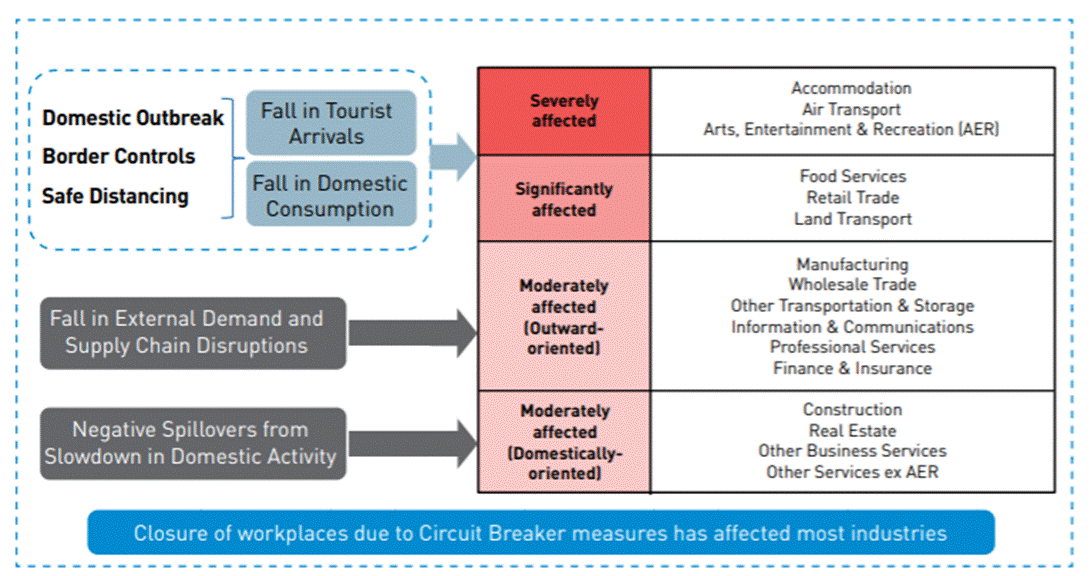Our guest blogger Graham Ng is a technopreneur based in Singapore. He helps enterprises transform through technology. He currently heads a team in digital strategy and transformation. Singapore has one of the most pro-business environments in the world, according to the World Bank. The economic impact COVID19 has had on Singaporean businesses and the possible remedies Ng discusses here could be applied in any of the world’s advanced economies.
Introduction
Singapore is one of the world’s most stable economies and yet it has not been spared by the effects of the Covid-19 pandemic. Global economic activities have slowed with some being brought to a standstill. According to the International Monetary Fund’s October 2020 report, the global economy contracted by 4.4% in 2020.
In turn, Singapore responded by adjusting its growth forecast in 2020 to -6% in November. The downward trend in the economy has affected business sectors differently. While sectors such as hospitality, transportation, arts, entertainment & recreation were severely affected; sectors such as manufacturing, wholesale trade, professional services & finance were moderately affected.

Most businesses in Singapore came to a complete halt in March 2020 due to the implementation of a circuit breaker to help contain the spread of Covid-19. This is partly due to the regulation that only essential services can operate during the lockdown period.
As Singapore gradually opens its economy, businesses are required to operate under strict conditions such as contact tracing, temperature verification, and the mandatory wearing of masks in public. Specific guidelines relevant to different industries were implemented to help stop the spread of Covid-19. The Singapore government advises all enterprises to facilitate and encourage their employees to work from home whenever possible.
During this period, many non-essentials SMEs temporarily survived with the swift implementation of relief measures such as rental rebates and a jobs support scheme provided by the government.
Prior to the Covid-19 pandemic in 2020, Singapore has already been actively pushing for a Digital Government and the Covid-19 pandemic has helped to escalate Singapore’s progress in these pursuits. Many enterprises turned to technology to meet the regulations set up by authorities and to facilitate working from home.
Business Requirements for Digital Solutions
So, what are the business requirements that enterprises look for in a digital solution to meet the challenges posed by the pandemic?
Speed to Production
For enterprises to continue operations, they are required to meet regulations set in place by the authorities. In most implementations, they turn to digital solutions that are less cumbersome and more productive. The time spent on development and deployment is vital to the survival of the enterprise.
Agility and Responsiveness
As the pandemic evolves, regulations are also adjusted to address the gaps. The digital solutions that are being put in place should be highly flexible to address these changing conditions. The technologies behind these digital solutions should be based on a DevSecOps developmental framework aimed at providing good response time.
Ease of Use / Usability
Digital solutions developed to meet current requirements and regulations are customer-oriented and have a direct impact on enterprises’ customer engagement. Quite often, temporary solutions are low in quality and do not provide ease of use. When developing digital solutions, enterprises should keep in mind customers’ expectations of applications being user-friendly and yet meeting their needs.
Security
The protection of personal data is mandated by law under the Personal Data Protection Act (PDPA) in Singapore. Enterprises need to comply with the act and take appropriate measures to protect user-information against leakages and potential threats.
Easily Available (Resources)
The technology deployed should be simple and easy to implement. Enterprises need a tech that is consistent and adapted to open standards for portability. What good will it be if the technology can do wonders, but requires a team of experts to develop and maintain it? In times of urgency, it is critical that anyone in the team can pick up the challenge and work on it. Thus, it is good to consider how can the solution be developed with the available resources.
In a recent article named “ Why Oracle is bullish about SEA’s cloud market in 2021 and beyond” by the Economic Development Board of Singapore, quoted the tech giant is doubling down on South East Asia (SEA), with plans to launch a new cloud region in Singapore by the end of 2021. It also states that Singapore has the connectivity, skilled workforce, and a network of qualified partners to enable Oracle to ride on the region’s growth and momentum. Armed with this information, enterprises across SEA can be assured of deploying digital solutions onto the Oracle Cloud platform.


Low-Code Development to Address these Needs
Speed, agility, ease of use, ease of availability, security, and adaptability are tenets of low-code development, the best example of which is Oracle Application Express (APEX).
Oracle APEX is a cloud-enabled, low-code development platform that allows enterprises to build applications that are secure and easy to use. This is achieved by extending through its developmental framework and it is tightly integrated with the Oracle Database. This framework help developers build modern, beautiful, and responsive applications without the need to be an expert in those areas.
Ease of Design, Development, and Deployment
APEX is based on a rich, browser-based interface that provides step-by-step assistance throughout the creation of an application. There are readily available components that enable the applications to contain high-level functions with less coding. This provides the building blocks which reduces the time for development. When ready, the modules can be deployed easily through the browser-based administration interface. Product owners have full control over the deployment schedule and versions. This eliminates the complexity of deployment and lowers the cost as compared to other alternatives. This results in increasing the speed to meet the challenges faced by the pandemic.
Secure and Portable Applications
APEX’s framework is developed to secure applications and data transmitting over the web. It contains the latest web & security standards and policies through the frequent patching which all Oracle products receive. The focus on security helps prevent malicious attacks on the applications. It can be deployed on the Oracle Cloud, on your own servers, or any machine which contains an Oracle Database. Enterprises may extend the application through customized web scripting such as with JavaScript or CSS, for example, or tap on Oracle’s PL/SQL for processing.
How much will this cost?
Oracle APEX provides free services to its customers until they are ready to upgrade. Like all other Cloud providers, the charge differs according to the service packages. In other words, it’s free to deploy a basic Oracle APEX web application on the Always Free Oracle Autonomous Database. Enterprises need only to create an account and thereafter, an Autonomous Transaction Processing (ATP) database service. Through the ATP instance, enterprises can access the database administration and web developer tools. There is a useful resource titled “Getting Started with Oracle Cloud Free Tier” by Adrian Png and Luc Demanche. I highly recommend this book as there are details in it that will help enterprises kick start their journey in the Always Free Oracle APEX.
Oracle Cloud Infrastructure (OCI) provides a set of cloud services that enables enterprises to build applications and digital services in a high availability hosted environment. Cloud services such as Analytics, API Gateway, Archive Storage, Audit, Blockchain, Compute (Virtual Machines), and many more! More information can be accessed at the Oracle website.
Summary
The Covid-19 pandemic has changed the way we live, study, work and socialize. There is a sudden accelerated need for digital solutions among industries, and the pandemic has become the biggest push for digitalization. The Society for Human Resource Management reported that 75% of the small-medium enterprises are confident that their business is better prepared to handle similar crises with digitalization.
The Covid-19 pandemic has made it obvious to enterprises that their speed to response and their choice of the technology platform is crucial to meet their needs for survival in pandemic times. The choice of a suitable technology platform will serve as an important factor in helping to position enterprises ahead of their competition.



